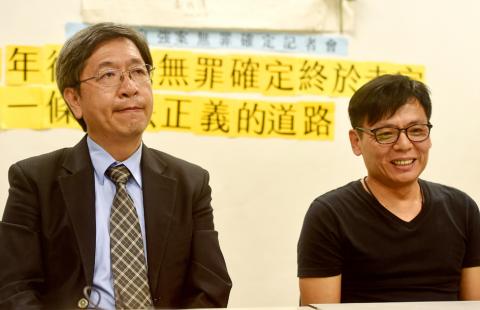In a final decision yesterday, the Supreme Court ruled that former death row inmate Hsu Tzu-chiang (徐自強) was not guilty of the 1995 kidnap and murder of a businessman, rejecting an appeal by prosecutors to end a case that has bounced around the court system for more than two decades and become one of the nation’s highest-profile human rights cases.
Prosecutors had appealed a High Court decision last year to overturn Hsu’s guilty verdict.
Accompanied by lawyers and supporters, Hsu fought back tears at a news conference in Taipei yesterday afternoon.

Photo: Chien Jung-fong, Taipei Times
“When I heard the ruling, it felt unreal to me; maybe I had heard it wrong,” Hsu said. “My mother will celebrate her birthday soon, and this will be the best gift she could get, because over the past 21 years, she has suffered the most.”
“I wanted to give up this fight, as I had given up on the justice system, but my family and my lawyers persisted; they did not want to give up,” Hsu said. “Some people asked if I had bad fortune, but I do not think so, because I feel lucky to be able to walk out of prison.”
Hsu was originally convicted of the September 1995 kidnap and murder of Huang Chun-shu (黃春樹), whose kidnappers sought a ransom of NT$70 million (US$2.2 million at current exchange rates).
Two men, Huang Chun-chi (黃春棋) and Chen Yi-lung (陳憶隆), who were convicted as being the main perpetrators and sentenced to death, had claimed in their trials that Hsu was an accomplice.
Hsu’s saga saw him handed the death sentence nine times and a term of life imprisonment twice, while there were five extraordinary appeals.
He was incarcerated for 16 years, spending most of the time on death row, before being released on May 19, 2012.

TRAGEDY STRIKES TAIPEI: The suspect died after falling off a building after he threw smoke grenades into Taipei Main Station and went on a killing spree in Zhongshan A 27-year-old suspect allegedly threw smoke grenades in Taipei Main Station and then proceeded to Zhongshan MRT Station in a random killing spree that resulted in the death of the suspect and two other civilians, and seven injured, including one in critical condition, as of press time last night. The suspect, identified as a man surnamed Chang Wen (張文), allegedly began the attack at Taipei Main Station, the Taipei Fire Department said, adding that it received a report at 5:24pm that smoke grenades had been thrown in the station. One man in his 50s was rushed to hospital after a cardiac arrest

SAFETY FIRST: Double the number of police were deployed at the Taipei Marathon, while other cities released plans to bolster public event safety Authorities across Taiwan have stepped up security measures ahead of Christmas and New Year events, following a knife and smoke bomb attack in Taipei on Friday that left four people dead and 11 injured. In a bid to prevent potential copycat incidents, police deployments have been expanded for large gatherings, transport hubs, and other crowded public spaces, according to official statements from police and city authorities. Taipei Mayor Chiang Wan-an (蔣萬安) said the city has “comprehensively raised security readiness” in crowded areas, increased police deployments with armed officers, and intensified patrols during weekends and nighttime hours. For large-scale events, security checkpoints and explosives

PUBLIC SAFETY: The premier said that security would be tightened in transport hubs, while President Lai commended the public for their bravery The government is to deploy more police, including rapid response units, in crowded public areas to ensure a swift response to any threats, President William Lai (賴清德) said yesterday after a knife attack killed three people and injured 11 in Taipei the previous day. Lai made the remarks following a briefing by the National Police Agency on the progress of the investigation, saying that the attack underscored the importance of cooperation in public security between the central and local governments. The attack unfolded in the early evening on Friday around Taipei Main Station’s M7 exit and later near the Taipei MRT’s Zhongshan

A car bomb killed a senior Russian general in southern Moscow yesterday morning, the latest high-profile army figure to be blown up in a blast that came just hours after Russian and Ukrainian delegates held separate talks in Miami on a plan to end the war. Kyiv has not commented on the incident, but Russian investigators said they were probing whether the blast was “linked” to “Ukrainian special forces.” The attack was similar to other assassinations of generals and pro-war figures that have either been claimed, or are widely believed to have been orchestrated, by Ukraine. Russian Lieutenant General Fanil Sarvarov, 56, head